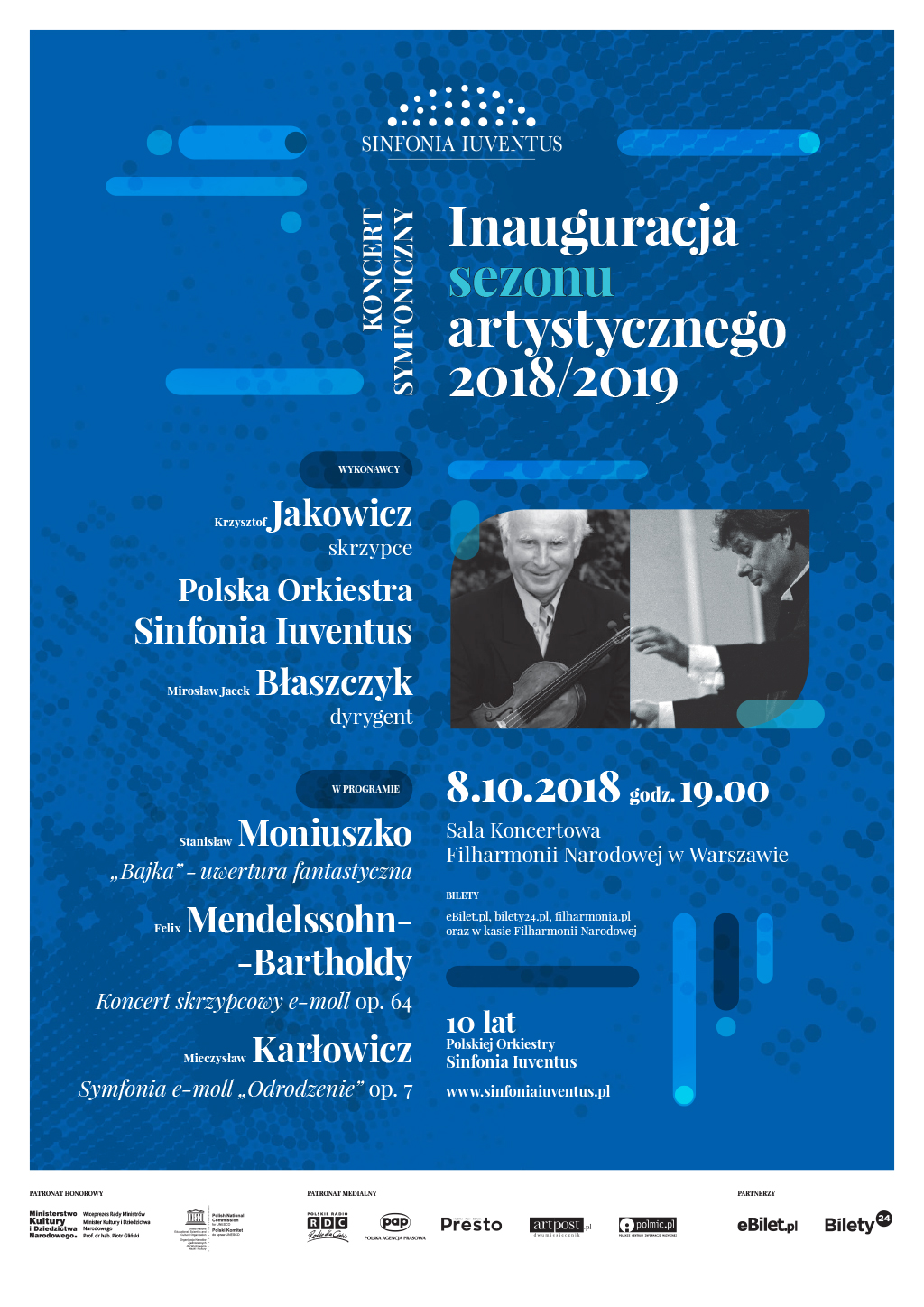Symphonic Concert. Inauguration of the 2018/2019 artistic season
The Polish Sinfonia Iuventus Orchestra led by Mirosław Jacek Błaszczyk will perform the 2018/2019 artistic season inauguration concert at the National Philharmonic Hall in Warsaw on the 8th October 2018. As solo artist will present Krzysztof Jakowicz. Honorary patronage: Deputy Prime Minister, Minister of Culture and National Heritage Professor Piotr Gliński, Polski Komitet ds. UNESCO

The greatest solo concertos in musical literature are often the product of the collaboration of a great composer with an outstanding virtuoso – this can also be said of Violin Concerto in E minor, Op. 64, the late masterpiece by Felix Mendelssohn composed for his friend, Ferdinand David. The latter was the concertmaster of the Leipzig Gewandhaus orchestra at the time when Mendelssohn led the ensemble, making it one of the most outstanding orchestras in Europe at the time. The first sketches of the work date back to 1838, but it took Mendelssohn six years to complete the concerto. The premiere took place on the 13th of March 1845, and the work was immediately received with enthusiasm by the audience, and from that moment on, it has not departed concert stages, remaining one of the greatest musical hits of all time. Mendelssohn’s typical beauty of the melody and the perfect balance between the solo and orchestra parts are combined here with an elaborate and innovative formal structure. Joseph Joachim, the “father” of 19th-century violinistics, who as a youth had the opportunity to meet Mendelssohn and experience his kind support, paid a beautiful tribute to the work near the end of his life: “The Germans have four violin concertos. The greatest and most uncompromising is Beethoven’s. Brahms’ concerto is close to Beethoven’s in its dignity. Max Bruch wrote the most magnificent and enchanting of all four. However, the dearest one of them all, the jewel of the heart, is Mendelssohn’s.” The audience of the inaugural concert will hear this masterpiece performed by Krzysztof Jakowicz, one of the most outstanding Polish violinists.
Before the era of the great symphonic poems, whose master was to be Mieczysław Karłowicz, concerto overtures played a similar role in narrative, programmatic forms. Moniuszko’s popular Fairy Tale from 1848 is an example of such suggestive music, whose contrasting themes form a fascinating “story” – but we never find out what it is about. The composer left this to the listener’s imagination without betraying any literary programme. We can only regret that this charming symphonic miniature remained isolated in the work of the composer, who almost entirely devoted himself to vocal forms, songs and operas, revealing his symphonic talent more than once, but only in the overtures and interludes of his works for the stage.
In 1895, young Mieczysław Karłowicz began his studies in Berlin, initially hoping for a career as a violin virtuoso. However, when these plans did not come to fruition, Karłowicz focused on his composing studies with Heinrich Urban. After creating a group of songs, a string serenade and music for theatrical drama (The White Dove), he started working on a new piece, which, according to the traditional principles of conservative education of composers, was to be the final test of his skills – the symphony. The young artist was lucky that his Berlin master did not respect the principles of rigid academicism and gave his adepts considerable freedom. Urban himself valued the music of Wagner, as well as that of Richard Strauss, who also fascinated Karłowicz, especially in the programmatic aspect. The future author of the great symphonic poems therefore undertook the ambitious intention of creating a programme symphony. The works of the 19th century provided many interesting patterns of such compositions. However, Karłowicz followed his own path. Although he admired Strauss, he did not refer to the models of his “narrative” and illustrative symphonic poems. He understood the programmatic aspect in psychological and symbolic terms. It was not supposed to paint stories, places or characters with sounds, but rather to convey the emotions and states of the soul evoked by them. The new work corresponds to the Classic-Romantic framework of the four-movement cycle, and its ideological basis is a comprehensive, original programme (published in Słowo Polskie before the Lviv premiere in 1903), in the Young Poland style. It speaks of a “gloomy, malicious singing” and a slow awakening of a soul immersed in lethargy (part I), contemplation of the world bathed in the rays of the sun (part II), the temptations of trivial pleasures to which the soul is exposed (part III) and finally – the eponymous rebirth of the human spirit to the call of the “eternal slogan”. Karłowicz’s Rebirth Symphony is perfectly communicative, even without the knowledge of the programme, it speaks to the listener with a great power of emotions and moods, varying between tragedy, melancholy, pathos, and euphoric joy. It was in this composition that Karłowicz’s individual style became fully crystallized, although he himself, always dissatisfied with his own achievements, also considered his wonderful symphony to be the fruit of his musical “apprenticeship” and did not intend it for print.
Performers:
Krzysztof Jakowicz | violin
Polska Orkiestra Sinfonia Iuventus
Mirosław Jacek Blaszczyk | conductor
Programme:
Stanisław Moniuszko Overture „Fairy Tale”
Felix Mendelssohn-Bartholdy Violin Concerto in E minor op.64
Mieczysław Karłowicz Symphony in E minor „Rebirth” op. 7
Tickets are available: ebilet.pl, bilety24, filharmonia.pl as well as in the box office of the National Philharmonic Hall in Warsaw. The price of the ticket is from 25 zł up to 60 zł
Media patronage: RDC – Polskie Radio, PAP, Presto, Art Post, polmic.pl
Partners: eBilet, bilety24
We invite you!
